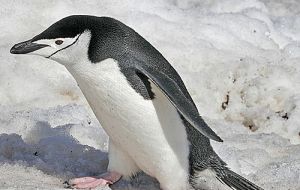MercoPress. South Atlantic News Agency
Antarctica Chinstrap penguins suffering the effects of a warming climate
 A third of breeding colonies lost in two decades
A third of breeding colonies lost in two decades The population of chinstrap penguins is feeling the heat, with more than one-third of a breeding colony lost in the past 20 years, new research finds.
A warming planet, which is causing sea ice in Antarctica (and elsewhere) to melt, may ultimately be to blame for the plummeting population, the researchers said. That's because the chinstraps' main food, shrimp-like creatures called krill, depend on algae that attaches to that ice.
“Actually, in the '90s it was thought that the climate change would favour the chinstrap penguin, because this species prefers sea waters without ice, unlike the Adélie penguin, which prefers the ice pack,” study researcher Andres Barbosa told LiveScience.
He added that at the time, chinstraps, named for the thin black facial line from cheek to cheek, seemed to increase in numbers, with some new colonies being established.
The sea-ice decline in the winter, however, has become so big that it is now impacting krill populations, said Barbosa, of the National Museum of Natural Sciences in Madrid.
Barbosa and his colleagues tallied chinstrap penguins (Pygoscelis antarctica) in the Vapour Col colony of Deception Island, in the Antarctic's South Shetland Islands in 1991-92 and 2008-09. They photographed nests in 19 sub-colonies, mainly in December when chicks were hatching.
Results, which ended up including just 12 of the sub-colonies due to availability of data, showed the occupied nests had declined by 36% between 1991 and 2008.
Barbosa and colleagues ruled out research activity as the cause for the loss since both studied populations and those used as controls showed similar patterns of decline.
Tourism is also not a likely culprit. Deception Island, built on a volcano, is one of the most visited places in Antarctica; the 2007-08 year saw some 25.000 visitors, according to the International Association of Antarctica Tour Operators (IAATO). Meanwhile, the nearby chinstrap penguin colony of Bailey Head, which is usually visited by 2.000 to 3.500 people every season, showed a decline of about 50%.
Rather, a dip in the krill population may be to blame, an idea supported by the fact that Adélie penguin population (P. adeliae) in the region is also declining, while the Gentoo penguin population (P. papua), which has a more variable diet, is not.
The chinstrap, gentoo and Adélie penguins are the three pygoscelid species (in the Pygoscelis genus) that inhabit the Antarctic Peninsula, the region of the Antarctic continent where the effects of climate change are more evident, the researchers noted.
But Barbosa says the chinstraps aren't a lost cause.
“This is an example of how the human activity far from the poles can affect the life at thousands of kilometres far from our homes,” Barbosa told LiveScience. “Therefore, a more responsible use of the energy and the fossil fuels is necessary to preserve the planet and then the Antarctica”.
In addition, he said, to protect the organisms that call the Antarctic home, we need to reduce human impact by reducing over-fishing, tourism and even research activity.




Top Comments
Disclaimer & comment rules-

-

-

Read all commentsVery surprised not to see Marco/Mike Bingham blaming the Falkland Islands Government and Oil exploration in Falkland Islands on the decrease in Chinstrap Penguin numbers.
Jun 20th, 2012 - 01:49 pm 0Well, they do have a track record of exterminating species.
Jun 20th, 2012 - 04:57 pm 0http://en.wikipedia.org/wiki/Falkland_Islands_wolf
Whereas Argentina has never sent any species to extinction within its territory.
TTT, But you have exterminated the indigenous peoples.
Jun 20th, 2012 - 05:06 pm 0Commenting for this story is now closed.
If you have a Facebook account, become a fan and comment on our Facebook Page!